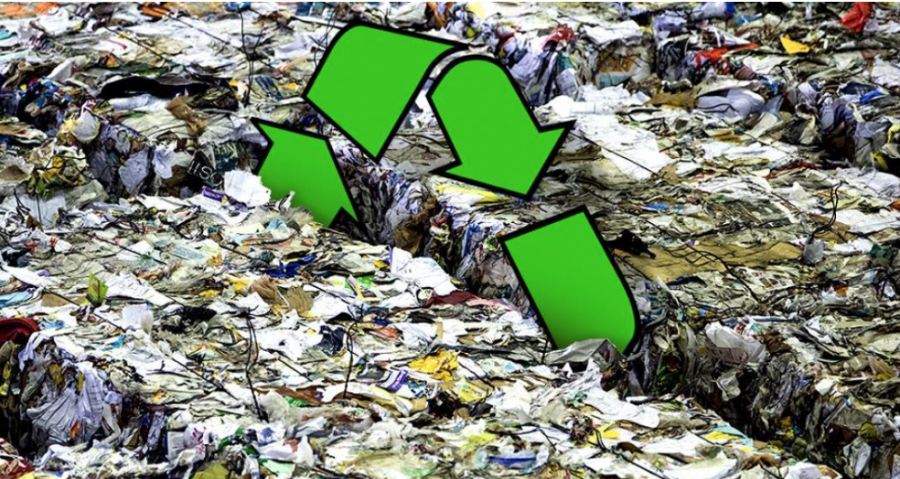Rashail Wasim With Earth Day coming up on April 22, there has been increased talk at Latin about how all of us are doomed and the planet is going to be unlivable in x number of years. We ask ourselves what can be done, and the three R’s inevitably come up: reuse, reduce, and recycle. Of the three, the most emphasis has been given to recycling, as shown by the little blue bins in every classroom at Latin. Everybody knows how the process works; you put all of your plastics, paper, and metals in the bin, a blue truck takes all of it to a factory, and the material is reforged so it can be used again. It’s a win-win for everyone! That is, until you consider that all of the factories are in the People’s Republic of China. Or rather, were in the PRC. In 2018, the Chinese Communist Party banned the import of any and all recycled goods that aren’t 99.5% free of contamination. For the United States, which has historically exported a little less than 40% of its recyclables to China, this change has been devastating for the industry. Exports of recycled goods plummeted 95% last year from its high of 716 million tons in 2016. This change was made because wages in China have risen rapidly, so it is no longer profitable to ship in foreign trash and sort out each material by hand. Alongside that, their growing economy has led to them producing a tremendous amount of their own waste, so their capacity for recyclable materials is now being filled by domestic sources. The ban on exports has had a crushing effect on the domestic industry. In cities across the US, recycling programs are being cut back. Philadelphia is the most extreme example; they went from selling recyclables for $67 a ton in 2012 to losing $40 per ton of trash they had to get rid of. Currently, the city is burning about half of the recycled materials it collects. Stories like this one are common across the country The biggest reason recycling is unprofitable is because of the poor job the US does in sorting its waste. In the US, single-stream recycling is used in almost 2/3rds of recycling programs; all plastics, metals, and paper is put into one bin. While this system makes things convenient for us, it makes it so that 25% of American recyclables are contaminated. People put garden houses and pizza boxes along with crumpled papers and bottles, which causes huge issues. It simply isn’t worth the cost to pay workers to sort everything, especially since they would have to be paid exponentially more than the Chinese workers that once did much of the job. The only way to rectify this problem is to divide up recyclables by material. Latin does a good job at this by labeling most of the blue bins as either for paper or bottled goods. However, there are only bins for paper materials in most rooms, and finding a place to put your used bottle is a hassle. As sophomore Timmy Devine put it, “I know it’s great to help the environment, but it can be so inefficient at times, especially when you are trying to get to class”. This apathy from us humans also gives notice to a larger problem with recycling; it has done little to stop our destructive habits. Over half of the plastic we have ever produced has been created in the last 16 years, even though we have grown more conscious of the environment than ever before. And even before the ban on exports to China, we were still recycling only 9% of the plastics produced, while the other 91% was burned or thrown into our landfills. Recycling is not a bad thing. But this Earth Day, let’s all acknowledge that it makes little more than a dent in the calamity that will occur if we keep resorting to half measures. As sophomore Lamar King notes, “Recycling only works if everyone recycles everything, which will never happen”. Instead of trying to diminish the impact of the plastic we use, we should be trying to reduce the amount we use in the first place. Multiple regions have banned plastic straws and/or started taxing plastic products. Chicago, for instance, has a $0.07 tax on every bag at checkouts. Initiatives such as Latin’s giveaway of reusable straws and the push for reusable water bottles are also good steps to help our environment. Recycling works to alleviate a symptom of our habits, but to prevent catastrophe, we have to come to terms with our culture of unthinking consumption. Sources: CBS News | American Cities Confront a “Slow-moving recycling crisis” The Week | The Recycling Crisis Wired | The World’s Recycling is in Chaos. Here’s What Has to Happen ]]>
Categories:
The Issues in the Recycling Industry
April 15, 2019
3
0
More to Discover























































zmcarthur • Apr 20, 2019 at 7:47 am
I’m so frustrated by the inconsistencies and for-profit nature of the recycling industry. Can’t our government understand the importance of it and make a full-scale push to be a flagship system for the rest of the world?
On a related note, I saw an interesting article lately that having one extra child increases greenhouse gases by a factor of 100x more than you can reduce them by recycling your whole life. This planet is screwed…
Good article, Rashail. Blankets forever. Mr. M
Robert!! :) • Apr 16, 2019 at 4:28 pm
What an interesting exposé, Rashail. It reminds us once again that to make a difference in the world, we have to put in more than the bare minimum. 🙂 🙂 🙂 Spectacular article Rashail!!
phosbein • Apr 16, 2019 at 1:38 pm
Thanks Rashil for covering this topic! Well written and thoroughly investigated!